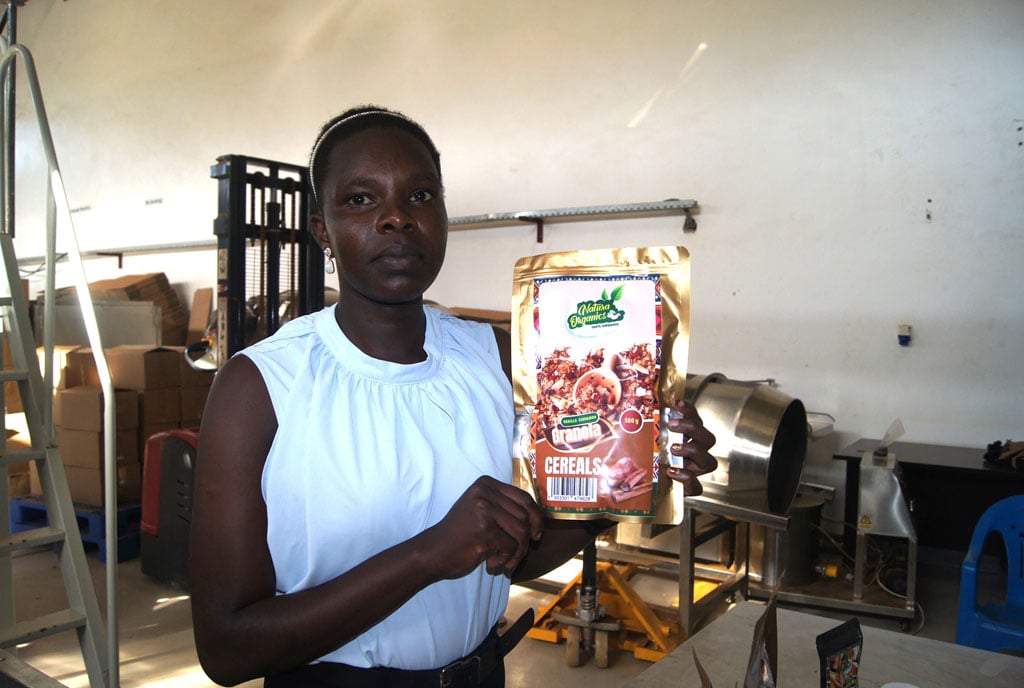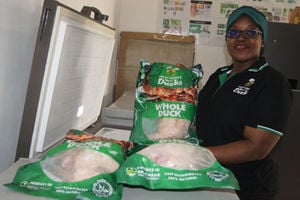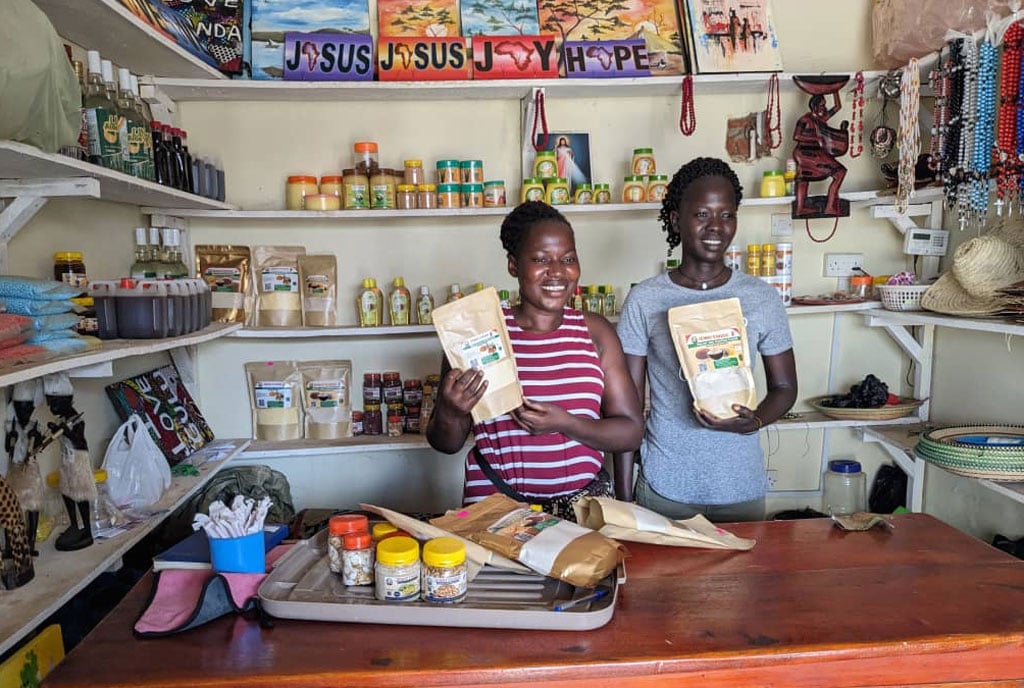
Cleopatra Akello displays one of the products she produces. PHOTO/JUSTUS LYATUU
Unlike other youth who after graduation start looking for white collar jobs, Ms Cleopatra Akello rolled her sleeves and went into agriculture.
With the help of her mother and some savings she had made while selling juices at university, she saw an opportunity in value addition.
Many farmers are getting peanuts from the sale of their produce; they don’t add value or are scammed by middlemen.
Starting
“We started processing organic food products in 2020 and legalising our business in 2021and today we are proud owners of Natura Nutrition Limited,” Ms Akello says.
“We started with a few products, now we boast of over 19 products in the market,” she says.
Background
Prior to Natura organics, she did a course in food and nutrition at Nakawa Vocational Institute, later pursuing a degree in Business Administration at Makerere University.
So, when she ventured into agribusiness, she had the marketing and product making skills.
“My business acumen started at university. For instance,, I used to sell fruit juices that gave me a head start and when I merged my business administration and the food and nutrition ideas and I was good to go,” she explains.
At Natura organics, she started with making peanut butter commonly known as odi/kipoli and breakfast cereals but went on introducing different products according to customer demand.
Her partners including her mother helped in areas such as marketing, coordinating farmers although some dropped out, currently Natura organics has seven members.
“We have a sales and marketing manager, social media managers; the business is four years did. The company is now incorporated as no customer wants to deal with a company that is not incorporated,” Ms Akello says.
Working with farmers
Ms Akello says apart from enrolling peasant farmers in her rural home district Lamwo, she is also working with farmers from Gulu, Amuru and Pader.
The farmers, mostly women, supply Natura organics with simsim, groundnuts, pumpkin seeds and honey.
“We have different agreements with farmers who supply us raw materials; we collect and bring to Consortium for enhancing University Responsiveness to Agribusiness Development Ltd (Curad)for processing,” she explains.
She adds:“Farmers we work with some are widows, single mothers most are peasants; we have impacted around 560 farmers.”
Natura organics also give farmers fertilisers to ensure quality and also buy from them at a better price.
Ms Akello says farmers are always exploited by middlemen who buy at a giveaway price especially during the peak of the harvest,
“When there is bumper harvest, with the fear of farm produce going bad, farmers sell at very low prices to middlemen,” she says.
She adds: “With us whatever is sold, 10 percent of the profits go back to the community to buy the girls pads, scholastic materials and shoes for going to school.”
Value addition
Other products include peanut butter, breakfast cereals, pumpkin flour, porridge flours, and mixed nuts; peanut oils, simsim oil and juices.
At Curad for instance the groundnuts are de-husked, then roasted, Ms Akello cannot afford her own roaster, then the grinding takes place, then the groundnuts are cooled and packaged at 400gms, 800gm and 1kgs.
Natura organics production and processing capacity is two- tonnes per product for the different 19 after every six months.
Market
According to Ms Akello, their biggest markets are households, shops and supermarkets; people going to gyms, specialty stores, health-conscious persons and foreigners.
“Our specialty shops include Ark-organics, Kololo, the Bountiful Duuka, and UWEPO in Jinja; we have not reached the export market but our plan is to get there,” she says, adding; “Getting an export market licence is not easy; we have attended many export trainings but getting the licence is still hard.”
Challenges
Ms Akello says Ugandans don’t believe in ‘made in Uganda’ they say they are fake.
“People still have that mentality that imported goods are superior yet they are over processed with little nutritional value compared to what we make here,” she says.

Farmers in Okulonyo village in Serere District grow groundnuts for seed processing show casing in their farm. PHOTO/NMG
Another challenge she says is that supermarkets delay paying even when there are well written contracts with them.
“Taxes are still high; there are a lot of presumptive taxes affecting many small businesses like ours,” she says.
Additionally, the high costs and process of certifications given by Uganda National Bureau of Standards (UNBS) is expensive for start-ups like Natura organics.
Ms Akello says: “For instance our case with 19 products it’s so costly, I look at it like we start-ups don’t have a voice.”
Future plans
Natura organics biggest dream is to get their machinery to produce all dream products which are currently shelved.
“We want to get the UNBS quality mark (Q-mark), this creates the confidence and trust in the market because Ugandans have a problem of trusting locally manufactured goods,” she says.
She adds: “When you have the Q-mark you can access all corners of Uganda and even the international market.”
Ms Akello says that her dream is to employ more youth especially from her supplying farmers on top of skilling the youth to become self employed.
Mr Abubaker Basajjabaka, programme administrator, hi-innovator at Curad says their aim is to help start-ups access machinery.
He explains that for the case of Ms Akello, Curad has a certification scientist who will guide her and connect them to UNBS.
“Our role in helping them go international is to help in aligning the standards that are needed, we also do quality control,” he says.
Olive branch
Mr Abubaker Basajjabaka, programme administrator, hi-innovator at Curad says their aim is to help start-ups access machinery. He explains that for the case of Ms Akello, Curad has a certification scientist who will guide her and connect them to UNBS.
Market
According to Ms Akello, their biggest markets are households, shops and supermarkets; people going to gyms, specialty stores, health-conscious persons and foreigners.

